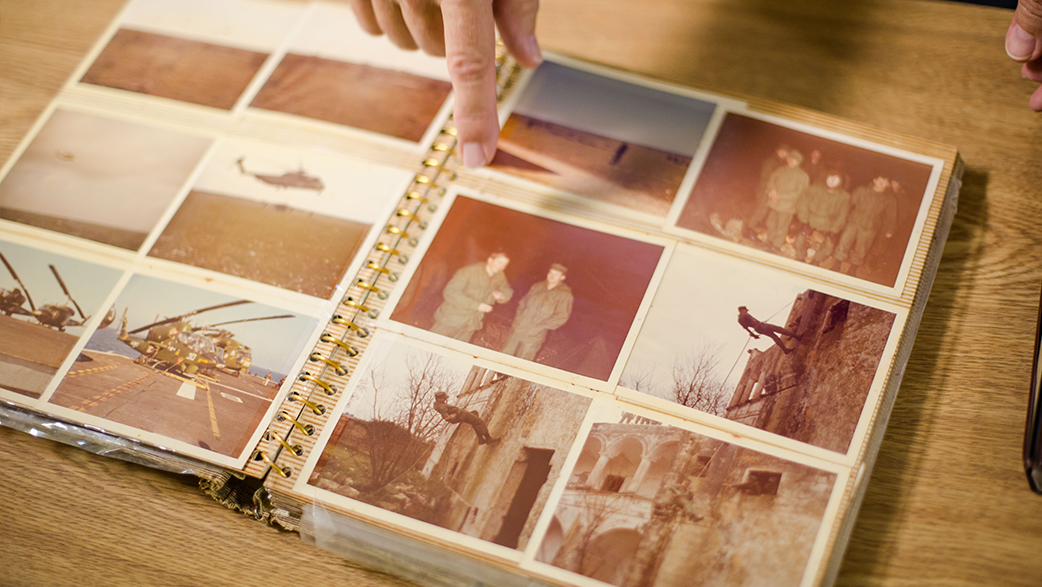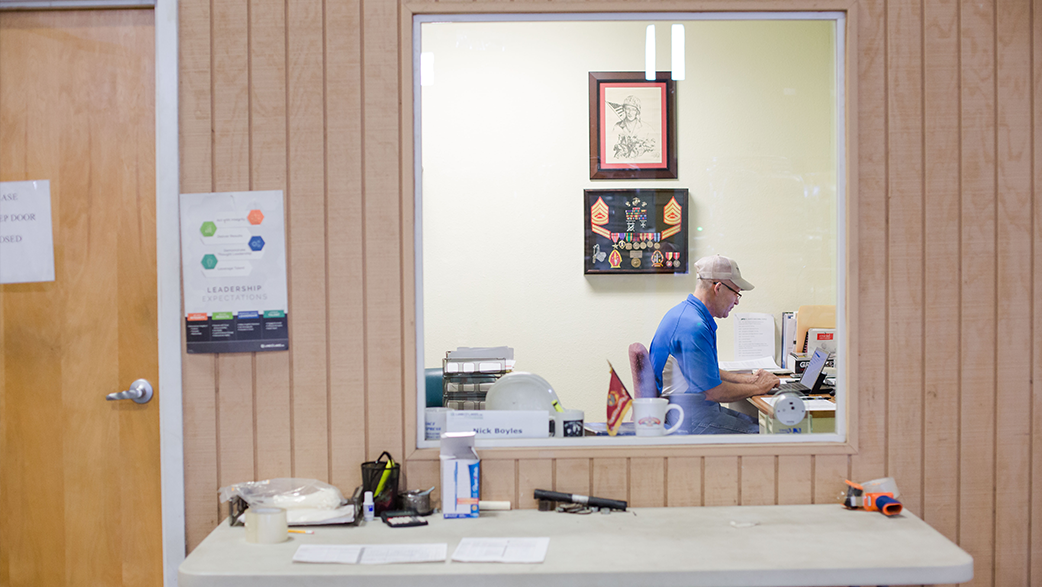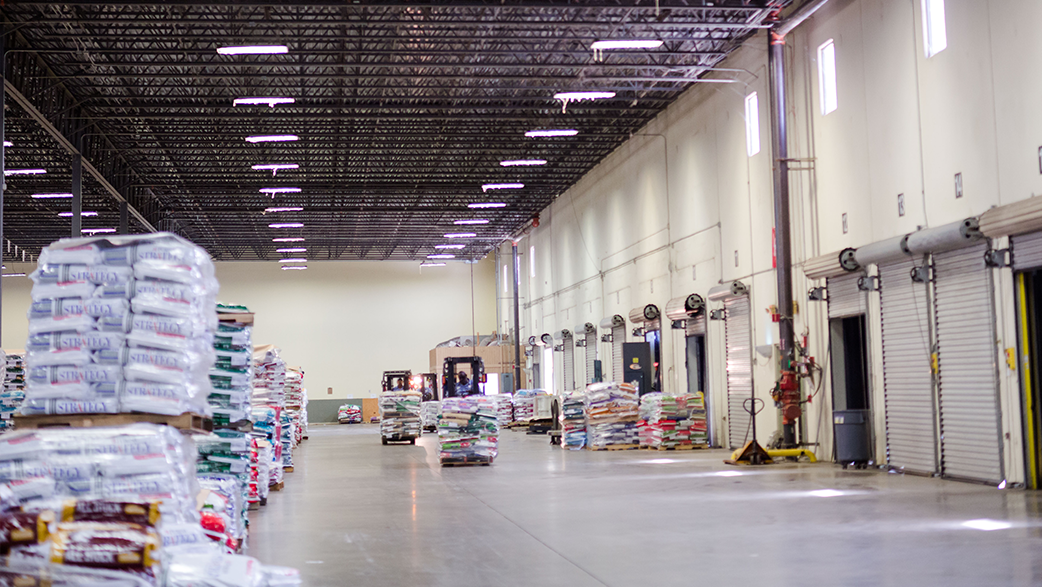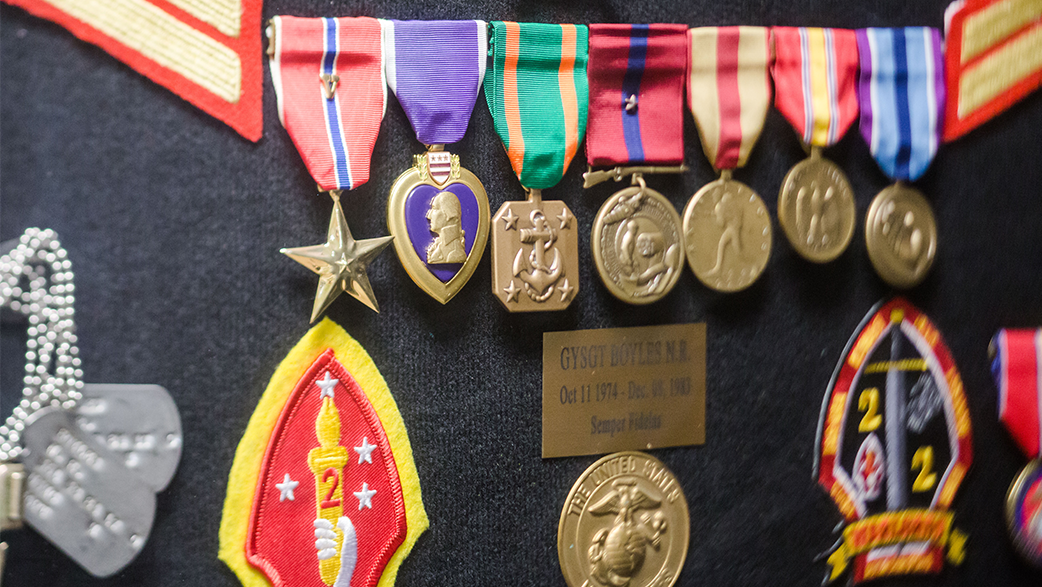A stack of photo albums sits on the desk. Worn and tattered from time, the pages are barely holding onto their faded images. Nick Boyles pulls up a chair and grabs the book on top of the pile. He flips to the first page and we’re instantly transported back to 1976. A young Marine smiles back at us. Apart from the buzzcut and beige uniform, he’s a spitting image of the 60-year-old man behind the desk.
“This is from my time in the Mediterranean,” Nick says.
He flips the page. We’re in Athens, Greece, touring the Acropolis. He flips the page again. The view changes to the inside a landing platform/dock, a type of warfare ship used to transport troops into a war zone, either by helicopter or smaller ships.

Nick grabs the second album. Now we’re in Puerto Rico. The photos reveal a base camp made from surprisingly homey Quonset huts, views of the beach, a glimpse of a pretty girl he used to date. Flip to a photo of him and his fellow Marines hiking through the jungle, scouting for Cuban guerilla fighters. Nick is energetically describing each photo in vivid detail, where he was, what they were doing. Nothing goes unexplained. Flip. Flip. Flip. He talks fast and he talks a lot.
The album snaps shut. We’re back to Nick, warehouse supervisor, sitting in his office at the Purina Animal Nutrition warehouse and distribution center in Lakeland, Florida, about 35 miles inland from Tampa. Interior office windows offer up a view of fork lifts effortlessly gliding by colorful stacks of animal feed. One look around and there is no doubt that Nick’s a proud Marine. Mementos, medals and more cover the walls and shelves.
And while Florida may be a far cry from his time spent sailing the seas, for the past nine years Nick and his family have called this place home. He’s been with Purina even longer. Just about 20 years ago, an offhand comment from some old coworkers led him to a company where he could put his military and leadership skills to good use each and every day.

“If there’s a difference from being a good military leader and being a good leader in life, I think it’s that I now I don’t tell someone to go do something, I show them how to do it first,” says Nick. “I want people to emulate me, to learn how to do it right the first time. And I want them to want to show others. That’s good leadership, I think.”
The day is just getting started, and with the walk down memory lane over for the moment, Nick’s ready to host an impromptu tour. He opens the door, a rush of hot air from the warehouse floods the air-conditioned room.
“Let me show you around,” he says, already a few steps ahead.
Feed warehousing 101
The floor of this 94,000-square-foot facility is spotless. Not a small feat for a feed warehouse, and certainly one benefit of a Marine overseeing the place. Nick remains a few steps ahead during the entire tour, walking fast. As he goes, he’s explaining the ins-and-outs of the Lakeland facility. As the warehouse manager, it’s his job to make sure things run efficiently and smoothly, and both employees and customers are happy.
The team is made up of two managers, warehouse coordinator and 11 production employees, working two shifts, from 5 a.m. to 10 p.m. Most of the 400 different feed items stored here are made at the nearby Mulberry and Lake City plants, with Purina horse feeds and Mazuri exotic animal feeds being the most popular. In fact, Lakeland is the largest shipper of Mazuri at Land O’Lakes, Inc.
“I like to tell people we help feed everything from earthworms to elephants,” says Nick.
He calls out to one of the forklift operators, an army veteran, using his “Marine voice.” Think drill sergeant. It’s an inside joke between the two. He cracks another joke about how a big change for him when he left the military was to learn when not to use his Marine voice. As the tour continues, the camaraderie between the entire team is clear.

“We have a lot of territory that we cover, Florida, Georgia, parts of Alabama, as well as parts of the Caribbean, and to coordinate all that with good customer service, that's an accomplishment,” says Nick. “Some days it's very hard. It's hot. There's a lot of work to do because we average 600 to 700 picks a day per person. We’re doing around 20-25,000 picks a week.”
Lakeland does mostly hand picks, or “picks.” How it works is when a customer places and order, a ticket is made in the back office. This ticket is picked up by one of the warehouse crew, who readies the order for shipping.
A full pallet is 40 stacked bags, but it’s not often the orders will contain only full pallets of a single feed. Most of the time the team builds a custom selection by driving their forklift from pallet to pallet and hand selecting what’s needed. It could be five bags of horse feed here, and three bags of tortoise chow there. It can be tedious work, and the team needs to stay on top of their game to make sure they’re picking the correct feeds.
Nick believes keeping spirits up plays an important role.
“I always find something to make my employees laugh or do something to make them smile,” he says. “If you're happy, you work better, you’re more attentive, you care more.”
The move into military
It’s mid-day and the team has changed over to the second shift. Nick heads to the back office to make sure everything is running smoothly. It’s not hard to see how he ended up leading a team, military or otherwise.
“I grew up in central Illinois, but spent a lot of time in Alabama with my relatives. For six weeks every summer, we’d go down to pick fruit and help with the corn, soybeans and cotton. So, I had some experience in agriculture, but I’m from a military family, going back to the Civil War. My uncles and older brothers were in the military. Growing up, I was planning to join the service.”
The summer before his senior year in high school, he enlisted in the Marine Corps. He’d considered the Army, but settled on this branch because it gave him more options and the chance to travel. But there was a slight problem—his mom wouldn’t let him get a GED and leave school early like his older brother. As friends and family members left to fight in the Vietnam War, Nick watched and waited to finish his final year.
He graduated in 1974 and soon found himself lined up with 80 fellow recruits in San Diego, California, sporting a new buzzcut and ready for 13 weeks of training. Living up the slogan of “The Few, The Proud,” only 39 made it to the end.
In 1975, Nick went active and was assigned to his first unit, Fox Company, 2nd Battalion, 2nd Marines. At the beginning of 1976, he began a 6-month cruise in the Mediterranean. Over the next six years, he’d take several more cruises and assignments, traveling to 60 different countries. Nick served during peacetime, so much of his time was spent training, learning and reading.
“Everyone in the Marine Corps is trained to be a leader, no matter where you rank—private all the way up to general,” says Nick. “From the start with basic training, you’re always learning. I loved it. Learning your job and how to do your job better. Learning from others. And they want you to make mistakes when you're training so that when you get into a real-life situation, you know what to do.”
In 1983, Nick got an opportunity to lead troops into combat. He’d asked to be stationed in Beirut during the Lebanese Civil War.
“I was in charge of a weapons platoon. I had 75 guys I was leading. We’d go on patrols, and you know, it gives you a lot of pride when everyone you took out there comes home safe,” says Nick.

But one day, everyone didn’t come home safe. There was a rocket attack. Nick remembers the shrapnel, the sensation of flying through the air, his cracked helmet. He remembers looking down and seeing metal in his leg, and not being able to get up.
He was sent to rehab in Parris Island, South Carolina. There he was given the choice to stay in or rotate home. He picked going home once his rehabilitation was done. What he didn’t know at the time was his injury likely saved his life.
On Oct. 23, a suicide bomber drove a truck into the United States Marine Corps barracks at the Beirut Airport. Nick had been stationed there. A truck bomb was detonated. An estimated 21,000 pounds of TNT created an explosion large enough to collapse the four-story building. Two-hundred and forty-one U.S. peacekeepers were killed.
“I probably knew 150 of them. My gosh, that was hard and humbling,” Nick says.
On Dec. 8, 1983, Nick was fully rehabbed and officially out of the military. He was 26-years-old, with a Purple Heart, a wife and two kids at home—and no idea where his career would go.
A career in agriculture
While it’s clear Nick’s team today is different from the team he led into combat all those years ago, the fundamental leadership skills needed remain the same.
“It's the same troubleshooting—like here's the problem, go fix it,” Nick says. “All day long, I'm working with customer service, I'm working with the drivers, I’m working with our employees. It’s a different type of leadership from the military, but you’ve still got to be able to make decisions—quickly—and you've got to be ok if you don't know the answer.”
There’s a story to how Nick ended up at Purina. After getting out of the military, he went to college and got a degree. He taught high school history for a couple years, before bouncing around for a few more years at various companies. Then in 1996, a couple of his coworkers at the industrial sewing machine company where he was working jumped ship. They told Nick they were going to Purina’s new facility in Statesville, North Carolina. Nick decided he’d also make the switch.
He started in the warehouse, but made it clear he’d like a management position. Three months later, he had one. Then in 2008, when Purina was setting up the Lakeland facility, Nick was asked if he’d make another move and get things up-and-running. He said yes, and has been in Florida ever since.
“I've had all sorts of jobs. But the thing is, with this company, everything they said they were going to do for me, they meant it. That got my loyalty,” Nick says. “I started in the warehouse, then moved into the office. I got promoted to management and ran a couple of warehouses, then I came down here and opened this facility. There are opportunities presented to you throughout your career here if you take advantage of them. There's no limit to how far you go in this company.”
Land O’Lakes recognizes the skills and leadership qualities learned in the military are transferable to many opportunities. Specifically, for any veterans considering a career in supply chain, and more specifically a career at Purina and Land O’Lakes, Nick offers up this advice.
“You're going to get the military structure and the opportunities,” he says. “This company offers the ability for growth. They recognize your contributions, use the skill sets that you bring, enhance them and help you find your place in what they're doing. I'm out in public all the time with the Land O’Lakes and Purina logos. And everyone I talk to, I tell them you're not going to find a better company. Our purpose, ‘Feeding Human Progress,’ it’s a great idea.”
Back in Nick’s office, his day is winding down. It’s been a busy one, but the team has it under control. The photo albums still sit on Nick’s desk, representing more than old memories.
“I'm always going to be a Marine,” he says. “Once you’ve earned that title, no one can take that away from you. You might be in another phase of your life, but you’re always a Marine.”